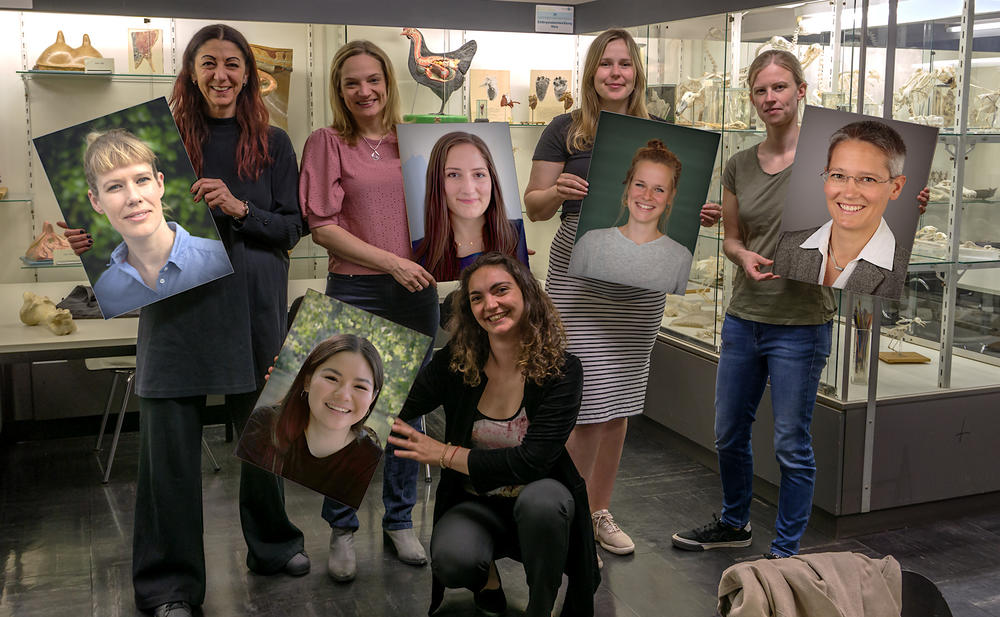Seven institutions in of our school publish joint paper on communication training in undergraduate education
At the end of April, an article by Prof. Dr. Mahtab Bahramsoltani (first author) and nine colleagues from our department was published in the journal “Animals” in the Special Issue “Education and Communication in Veterinary Clinical Practice” about the success of communication training in veterinary medicine studies at Freie Universität Berlin.
News from Jul 05, 2023
The study investigated the effects of communication courses on the assessment of the competencies that veterinarians need in their professional activities and on the students' self-perception of their own communication skills. What is special about this study is not only the fact that a topic that previously received less attention in teaching because it was considered a “soft skill” is now relevant in both teaching and research. It also shows how well and successfully the scientists from seven different institutes/clinics of the school work together in this area.
For, in addition to Prof. Dr. Mahtab Bahramsoltani, Alina Prior and Rebecca Schirone from the Institute of Veterinary Anatomy participated in the article “Outcome of Communication Training in Veterinary Studies: Influence on the Perception of the Relevance of Veterinary Competencies and Self-Assessment of Communication Skills” the colleagues Prof. Dr. Sonja Bröer (Institute of Pharmacology and Toxicology); Dr. Susann Langforth and Ting-Ting Li (Institute of Food Safety and Hygiene); Prof. Dr. Corinna Eule (Small and Pet Animal Clinic); Dr. Lena Vogt (Veterinary Skills Net); Dr. Alina Pohl (Animal Reproduction Clinic); and Dr. Charlotte Jensen (Institute of Veterinary Epidemiology and Biometry).
In addition to teaching and research in their respective disciplines, these scholars are involved in teaching communication at the department, which includes several elective courses as well as two required courses: an e-learning course on the fundamentals of communication in the second semester and a role-play-based practical course in the fifth semester.
The study shows that students who have taken the practical communication course rate their communication skills for professional success in veterinary medicine higher than students who have not yet taken the course. These students also rated their own communication skills higher after taking the course. This indicates that especially the practical application of the learned communicative strategies helped them to perceive an improvement in their communicative skills, from which they will certainly benefit in their professional life.
Thus, the study achieved one of the goals of its authors: to show that there is not only a need for professional communication skills among veterinarians, but also that an awareness of this should be created during their studies. Many students are often not (yet) aware of this, as they have not experienced it as a lack without practical experience, but the two courses so far have aroused great interest in this topic among some students, which they now want to deepen. Rebecca Schirone, who together with student Anna Klameth has offered an elective course on communication for twenty participants this summer semester, building on the practical compulsory course, is pleased about this.
Dr. Susann Langforth had the initial idea of having a scientific study emerge from the practical teaching findings. When asked where the initiator sees this field in ten years, she replies that “hopefully it will be more self-evident that communication can and should be learned in order to apply this skill more purposefully in all areas of veterinary existence.” Her colleague, Dr. Charlotte Jensen, believes that not only will teaching evolve, but so will research in the field. “In veterinary medicine, there are so many different areas that require good, sophisticated communication, for example, with farmers, at slaughterhouses, in home and small animal clinics with patient owners. Veterinarians are doing themselves a favor, for their mental health, when they professionalize, for example, the delivery of bad news, euthanasia, etc., and the handling of possible reactions in a communicative way.”
Currently, the Ordinance on the Licensing of Veterinarians (TAppV) does not require the study of communication, which implies that there are no human resources for it. Prof. Mahtab Bahramsoltani regrets this very much and adds: “One goal must be that the teaching of these skills is not only on voluntary shoulders, but that there are of course positions for scientists for this and that communication becomes a required subject according to the TAppV – not as a ‘soft skill’ but as a ‘hard skill’.”
Rebecca Schirone sums it up in conclusion: “There is still room for improvement.”
